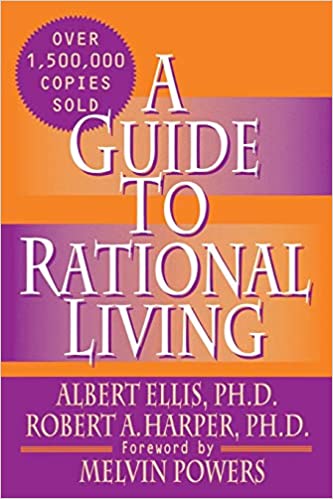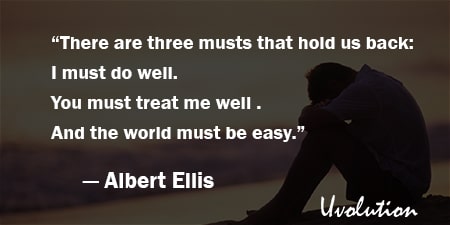A Guide to Rational Living by Albert Ellis
The Book in 1 Sentences
“Can we really change such well-practiced mental attitudes? Definitely. Will it be easy? No—but those who diligently work with the cognitive, emotive, and behavioral “tools” of REBT have an excellent chance of success.” ~ Albert Ellis & Robert A. Harper
10 BIG Ideas
1. The Roots of Neurosis: Distorted Thinking - Irrational Beliefs
2. ABC Model of Emotional Arousal: Action-Belief-Consequence
3. Stop Searching for Perfection!
4. Healthy & Unhealthy Negative Feelings
7. Difficult Does NOT Mean Impossible
A Guide to Rational Living Summary
“Thus, you may reduce your depression by using drugs or relaxation techniques. But unless you begin to think more clearly and surrender some of your Irrational Beliefs, you will tend to depress yourself again when you stop the drugs and exercises.
To effect permanent and deep-seated improvements, philosophic changes seem to be best.
Again, we often encourage our clients to use medication, relaxation techniques, movement therapy, yoga exercises, or other physical approaches. We believe that these techniques may help.
And we teach, as we shall show later, many emotive, dramatic, fantasy, self-management, and behavior modification methods. More than most other schools of therapy, REBT [Rational Emotive Behavioral Therapy] employs a comprehensive, integrative approach to treatment.
We still hold, however, that if you would most thoroughly and permanently change your disturbed feelings, you’d better use considerable reasoning. Because a large element (though not the whole) of destructive emotion stems from unrealistic, illogical, and self-sabotaging thinking.”
1. The Roots of Neurosis: Distorted Thinking - Irrational Beliefs
“A discussion of the roots of neurosis is mainly a discussion of distorted thinking. From the point of view of mind/brain as computer, most human beings are innately poor programmers.
They seldom succeed in setting themselves up to get along very happily in an imperfect world. Neurotics are especially bad at it. Although irrational behavior is sometimes due to faulty “hardware,” such as neurological impairment, it is also due to faulty “software,” to self-created, self-defeating Irrational Beliefs.”
So, it’s all about re-programming and rewiring our brains and challenging our “Irrational Beliefs”.
As Will Bowen says in his great book A Complaint Free World: “Less pain, better health, satisfying relationships, a better job, being more serene and joyous ... sound good? It’s not only possible, it’s probable. Consciously striving to reformat your mental hard drive is not easy, but you can start now and in a short period of time—time that will pass anyway—you can have the life you’ve always dreamed of having.”
2. ABC Model of Emotional Arousal: Action-Belief-Consequence
“The mechanism of such an emotional disturbance is not difficult to grasp. It looks, at first blush, as though it’s just a matter of “stimulus” and “response”—as if something unfortunate happens to people (the stimulus), and that, by itself, causes them to get upset (the response).
But it looks that way only because, when something unfortunate happens, the key element of emotional arousal—their irrational thinking—leaps into action almost instantaneously and, of course, largely out of sight.
The actual mechanism of an emotional disturbance is a stimulus-belief-response, or as we say in REBT: “Action-Belief-Consequence.” These are the terms behind REBT’s well-known ABC model of emotional arousal.
Bottom line: it’s not our life events (Actions) that, themselves, directly disturb us (produce unpleasant emotional Consequences). It’s our irrational demandingness, our shoulds, oughts, and musts (Beliefs), that largely do the job.”
“Insisting that things *ought* to go smoothly, that mishap *must* not occur, and that the important people in our lives *should* behave as we have told them so many times we *need* them to behave... is fundamentally irrational. Yet, as a species, we naturally tend to think in these distorted and self-defeating ways.”
Again, it’s all about our “Irrational Beliefs”!
So we need to learn how to step in between the stimulus and our normal response so we can choose the most empowered response that we can do.
Exercise: Practicing Optimism
In The How of Happiness, Sonja Lyubomirsky tells us: “Write down your barrier thoughts, and then consider ways to reinterpret the situation. In the process, ask yourself questions like... What else could this situation or experience mean? Can anything good come from it? Does it present any opportunities for me? What lessons can I learn and apply to the future? Did I develop any strengths as a result?”
And she also says: “Essentially, all optimism strategies involve the exercise of construing the world with a more positive and charitable perspective, and many entail considering the silver lining in the cloud, identifying the door that opens as a result of one that has closed. It takes hard work and a great deal of practice to accomplish effectively, but if you can persist at these strategies until they become habitual, the benefits could be immense. Some optimists may be born that way, but scores of optimists are made with practice.”
Back to Albert Ellis & Robert A. Harper, they say: “Positive thinking... allows you to create rational coping self-statements and images that aid your goals and enhance your life. However, it is limited, and sometimes even dangerous, b/c you can easily use it unrealistically and polyannaishly.
Thus, you can positively tell yourself, “I can accomplish anything I want!” But, of course you can’t. You can enthusiastically think, “Everything will happen for the best.” But, alas, it won’t. Positive thinking, moreover, often covers up and doesn’t really remove your underlying negative thinking.”
3. Stop Searching for Perfection!
“Let us emphasize that we do not believe that any human can, for any length of time, feel perfectly or completely happy. Your frantic search for a perfect anything, in fact, almost dooms you to misery.
You aren’t the kind of animal that achieves perfection in virtually anything—especially perfect happiness. Because of your ever-changing experiences, you are subject to hundreds of irritations, pains, ills, diseases, and stresses. So you can overcome many of your physical and emotional handicaps, as we show in this book. But not all.”
As Tal Ben-Shahar -in his book The Pursuit of Perfect- advises us to become an Optimalist rather than a Perfectionist. That’s when we try to create the best possible life rather than the perfect one.
Powerful idea!
4. Healthy & Unhealthy Negative Feelings
“Misery, in other words, consists of two fairly distinct parts:
(1) desiring, wishing, or preferring that you achieve some goal or purpose and feeling disappointed and irritated when you do not achieve it;
and (2) demanding, insisting, commanding, and necessitating that you achieve your goal or purpose and making yourself feel bitter, enraged, panicked, despairing, and self-drowning when you do not.
In REBT, we distinguish between healthy feelings of sorrow or irritation when you lose something you desire; and unhealthy feelings of depression or rage stemming from your refusal to accept frustrations, and from your whining that they absolutely must not exist.
If you think rationally (self-helpingly), you will feel greatly disappointed or sad about the loss of a person you care for. But you need not also feel utterly overwhelmed and depressed about the same loss.
You may sanely choose to feel strongly annoyed or irritated by frustrating conditions. But you need not make yourself feel very enraged or self-pitying about these defeats.
While your feelings of loss or grief are healthy reactions to distinct loss, your feelings of panic or depression are not.”
“Emotional disturbance often consists of taking a healthy *wish* for approval and turning it into an unhealthy *demand.* Then refusing to do much to win it.”
“Moreover, where frustration, sorrow, and unhappiness are frequently healthy feelings—assuming that you greatly desire something and are deprived of it—depression, despair, shame, and self-downing are practically never healthy and had best be minimized.”
5. Don’t Just Think: Act!
“To modify your destructive habits, you’d better think and act. Deliberately work against the influence of the past; force yourself, for example to act toward your father in a more adult fashion, to risk his disapproval, to say and do things that you previously would have been panicked to do.
If you never in all your life talked to a stranger on a bus, went to a party alone, kissed a partner on your first date, or did similar things that you would like to do, force yourself until you keep trying these terrible “fearful” acts. No nonsense!
Don’t just think: act! You can overcome years of past anguish and inertia by days or weeks of forced practice today.”
So, remember that it’s not enough to just “think” about these ideas and transform our thoughts. We need to “act” in line with our new beliefs
6. Life is an Experiment
“In the final analysis, however, you’d better make some kind of plunge. Make this plunge experimentally, with the full knowledge that it may work out well—and it may not.
If you fail, it will be unfortunate, but rarely catastrophic. And failure doesn’t have anything to do with your intrinsic value as a person.
Humans mainly learn by doing and by failing—a fact that you can, without liking it, gratefully accept.”
7. Difficult Does NOT Mean Impossible
“Difficult, however, does not mean impossible. Of course, you will find it hard to think and to act rationally in an irrational world. Of course you will have trouble reasoning your way out of circumstances which have handicapped you for many years.
All right, it is difficult. But it is also difficult for a blind man to learn to read Braille, a victim of polio to use his muscles again, or a normal person to swing from a trapeze, learn ballet dancing, or play the piano well. Tough! But they—and you—still can do it.”
Marcus Aurelius - in his Meditations - says: “Because a thing is difficult for you, do not therefore suppose it beyond mortal power. On the contrary, if anything is possible and proper for a man to do, assume that it must fall within your own capacity.”
8. The Essence of Neurosis: Blaming—or Damning
“We can actually put the essence of neurosis in a single word: blaming—or damning. If you would stop, really stop, damning yourself, others, and unkind conditions, you would find it almost impossible to upset yourself emotionally—about anything. Yes, anything.”
“Most people spend so much time and energy trying to do the impossible—namely, to change and control the actions of others—that they wrongly believe that they cannot achieve a quite possible goal—to change their *own* thoughts and acts.”
I recommend reading A Complaint Free World -by Will Bowen- to learn more about this idea and get some practical exercises too 🙂
9. Accept Yourself
“Yes, you acted poorly, and will keep getting unfortunate results if you continue to act that way. But don’t, under any conditions, put down yourself, your entire personhood, for making such errors. Don’t blame or devil-ify yourself in any way, no matter how many times you err. Your acts may be foolish or immoral, but you cannot justifiably be damned or downed, or devil-ified for performing them.”
10. DO SOMETHING!
“People rarely feel particularly happy or alive when inactive except for short periods of time between their exertions. Although they may get tired and tense when continuously on the go, they are easily bored and listless when they constantly rest.
Passive “enjoyments,” such as reading, play-going, or watching sporting events, are often entertaining and relaxing. But a steady diet of this kind of “activity” often leads to dullness and apathy.
Intelligent people tend to require vitally absorbing activity to stay most alive and happy. They rarely are enthusiastic for any length of time unless they have some rather complex, absorbing, and challenging occupations or interests.”
As Sonja Lyubomirsky - in The How of Happiness - says: “In 1932, weighed down by the sorrows and agonies of his self-absorbed and aimless clients, an Australian psychiatrist named W. Béran Wolfe summed up his philosophy like this: ‘If you observe a really happy man you will find him building a boat, writing a symphony, educating his son, growing double dahlias in his garden, or looking for dinosaur eggs in the Gobi Desert.’ He was right.
People who strive for something personally significant, whether it’s learning a new craft, changing careers, or raising moral children, are far happier than those who don’t have strong dreams or aspirations. Find a happy person, and you will find a project.”
And always remember that “Your present behavior largely stems from your thinking. So by determined rethinking and practice, you can regulate and control your activities of today—and also prepare for an improved future.”
That was my QUICK summary of A Guide to Rational Living. If you’re interested, get your copy. There is a HUGE amount of wisdom and life-changing ideas in this book, and we’ve only touched on a tiny bit of it.
Buy The Book: A Guide to Rational Living by Albert Ellis

GET Blinkist 7 Days FREE Trial
3000+ Book Summaries
(Audio and Text)








